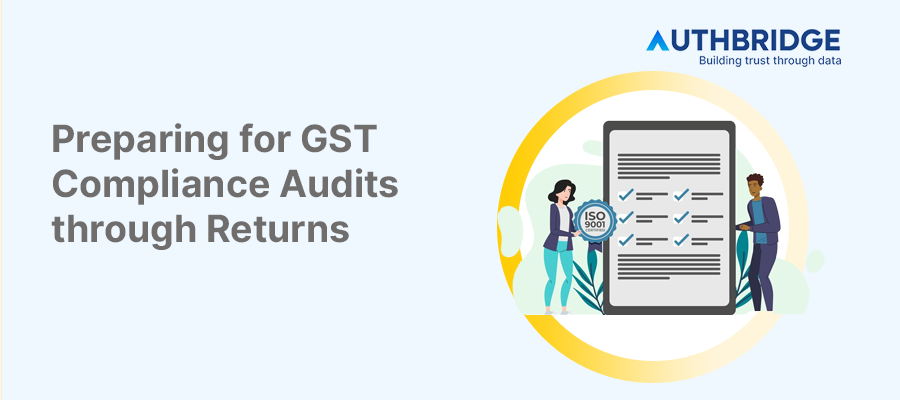Preparing For GST Compliance Audits Through Returns

Preparing for GST Compliance Audits through Returns
Understanding GST Audits
GST audits are examinations of records, returns, and other documents maintained by a GST-registered person. The purpose is to verify the accuracy of information declared, taxes paid, compliance with GST laws, and to assess the taxpayer's compliance level.
Types of GST Audits
- Based on Turnover: For businesses with a turnover exceeding a specified threshold, making it mandatory to undergo an audit by a chartered accountant or a cost accountant.
- General Audit: Conducted by the tax authorities to scrutinize the correctness of the turnover declared, taxes paid, and ITC claimed.
- Special Audit: Initiated in special cases where there is a significant discrepancy or anomaly in the returns filed by the taxpayer.
Key Areas of Focus in a GST Audit
- Financial Records and Statements: Examination of balance sheets, profit & loss accounts, and cash flow statements for any discrepancies.
- Compliance with GST Returns: Verification of timely filing of returns such as GSTR-1, GSTR-3B, and annual returns along with the accuracy of the information reported.
- Input Tax Credit (ITC) Utilization: Scrutiny of the ITC claimed, ensuring it is in line with the GST provisions, and verification of the eligibility criteria.
- Tax Payments and Liabilities: Assessment of the GST paid and any outstanding liabilities. This includes checking the tax rates applied to various supplies.
- Documentation and Invoices: Review of sales and purchase invoices, credit/debit notes, and other relevant documents to ensure they meet GST requirements.
- Reverse Charge Mechanism (RCM): Evaluation of compliance with the RCM provisions, including the payment of taxes on specified services or goods under RCM and the eligibility to claim ITC on such taxes.
- Refunds: If applicable, verification of the eligibility for GST refunds, the accuracy of the refund applications, and the documentation provided.
Preparing for a GST Audit
- Organize Records: Ensure all financial records, invoices, and documentation are organized and readily available for review.
- Review Previous Returns: Re-examine all GST returns filed during the period under audit to identify and rectify any discrepancies or errors.
- ITC Reconciliation: Perform a thorough reconciliation of ITC claimed in the returns with the credit ledger and purchase records.
- Compliance Check: Conduct an internal compliance check to ensure adherence to all GST provisions, including timely returns filing, accurate tax payments, and proper documentation.
- Seek Professional Help: Consider engaging a GST expert or consultant for a pre-audit check to identify potential areas of non-compliance and advice on corrective measures.
Documentation Checklist
- GST Returns Filed: Copies of all GST returns filed during the audit period.
- Financial Statements: Audited financial statements, including balance sheets, profit & loss accounts, and cash flow statements.
- Tax Invoices and Bills: All sales and purchase invoices, credit/debit notes, and receipts.
- Bank Statements: To verify the payment of GST liabilities and other financial transactions.
- ITC Documentation: Records supporting the ITC claims, including purchase invoices and GST payment receipts.
- RCM Documents: Documentation related to supplies under reverse charge and evidence of tax payments.
GST Compliance Audit: Detailed Checklist and Data Tables
GST Compliance Audit Checklist
Area of Compliance | Checklist Item | Compliance Status (Yes/No) | Remarks |
GST Registration Details | Verify accuracy of GSTIN in all documents. | ||
Financial Records | Reconciliation of sales and purchases with financial statements. | ||
GST Returns Filing | Timeliness and accuracy of GSTR-1, GSTR-3B, and annual returns. | ||
Input Tax Credit (ITC) | ITC claimed matches with invoices and eligibility criteria. | ||
Tax Payments | GST payments are up-to-date and accurate. | ||
Documentation | Availability of all purchase and sales invoices, credit/debit notes. | ||
Reverse Charge Mechanism (RCM) | Compliance with RCM provisions and payment of taxes. | ||
Refunds | If applicable, correctness of refund applications and supporting documents. |
Financial Records and GST Returns Reconciliation
Financial Statement Item | Amount (₹) | GST Return Reference | Amount Reported in GST Return (₹) | Variance (₹) |
Total Sales | GSTR-1 | |||
Total Purchases | GSTR-2A/2B | |||
ITC Claimed | GSTR-3B | |||
GST Paid | GSTR-3B |
Input Tax Credit (ITC) Eligibility and Utilization
Invoice Date | Supplier GSTIN | Invoice Number | Taxable Value (₹) | GST Amount (₹) | Eligible for ITC (Yes/No) | ITC Claimed (₹) |
Reverse Charge Mechanism (RCM) Compliance
Supply Date | Supplier Details | Nature of Supply | Taxable Value (₹) | GST Paid Under RCM (₹) | ITC Availed (₹) |
Refund Claim Documentation and Tracking
Refund Application Date | Type of Refund | Amount Claimed (₹) | Status (Processed/Pending) | Amount Sanctioned (₹) | Date of Sanction |
Conclusion
Preparing for a GST compliance audit involves a meticulous review of your GST registrations, financial records, return filings, ITC claims, tax payments, and adherence to all GST provisions. Utilizing the checklists and data tables provided can help streamline the audit preparation process, ensuring that all necessary documentation is accurate and readily available. This proactive approach not only facilitates a smoother audit process but also helps in identifying and rectifying discrepancies in advance, thereby minimizing the risk of non-compliance penalties.
Category

Abhinandan Banerjee
(Associate Manager - Marketing)
Abhinandan is a dynamic Product and Content Marketer, boasting over seven years of experience in crafting impactful marketing strategies across diverse environments. Known for his strategic insights, he propels digital growth and boosts brand visibility by transforming complex ideas into compelling content that inspires action.



